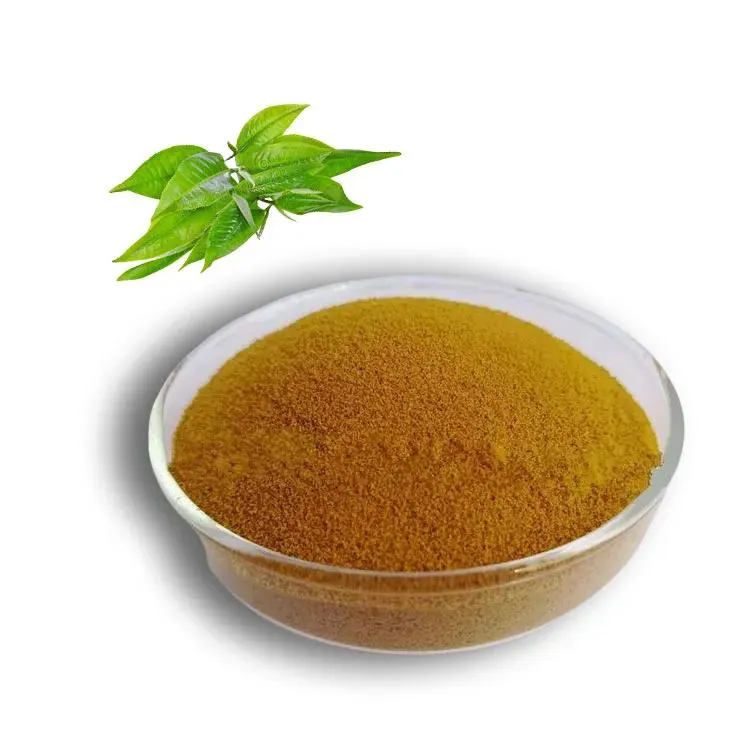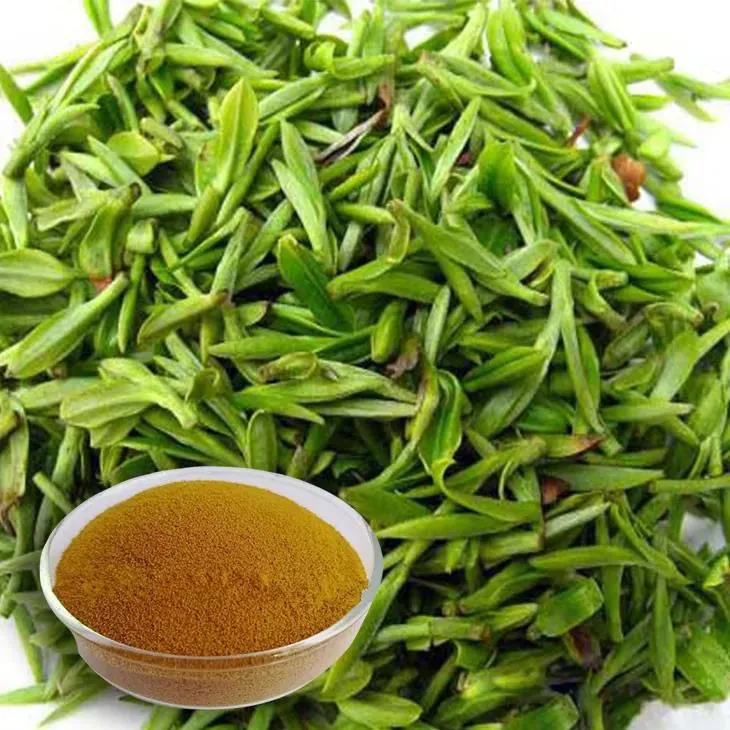- 0086-571-85302990
- sales@greenskybio.com
Application of Green Tea Extract in Skin Care.
2024-11-13

1. Introduction
In the world of skin care, the search for natural and effective ingredients is an ongoing pursuit. Green Tea Extract has emerged as a highly popular and promising component in this regard. Green tea, which has been consumed for centuries for its various health benefits, is now making a significant impact in the field of skin care. The extract obtained from green tea contains a rich variety of bioactive compounds, with polyphenols being the most notable. These polyphenols are responsible for the multiple beneficial effects that Green Tea Extract can have on the skin.

2. Composition of Green Tea Extract
2.1 Polyphenols
The polyphenols in green tea extract are a complex group of compounds. The most abundant type is catechins, which include epigallocatechin - 3 - gallate (EGCG), epicatechin - 3 - gallate (ECG), epigallocatechin (EGC), and epicatechin (EC). EGCG is considered the most active and potent catechin in terms of its biological effects. These polyphenols are powerful antioxidants, which means they can neutralize free radicals in the skin. Free radicals are unstable molecules that can cause damage to skin cells, leading to premature aging, wrinkles, and a dull complexion.2.2 Other Components
Besides polyphenols, green tea extract also contains amino acids, vitamins (such as vitamin C and E), minerals (like manganese), and caffeine. The amino acids contribute to the skin's hydration and overall health. Vitamins C and E work synergistically with the polyphenols in antioxidant defense. Manganese is involved in enzyme activation related to skin metabolism, and caffeine can have a mild diuretic effect on the skin, which may help in reducing puffiness.
3. Antioxidant Properties
3.1 Protection Against Free Radicals
The antioxidant properties of green tea extract are of great significance for skin health. Our skin is constantly exposed to environmental stressors such as ultraviolet (UV) radiation, pollution, and cigarette smoke. These factors generate free radicals in the skin. When free radicals are present in excessive amounts, they can initiate a process called oxidative stress. This oxidative stress can damage the skin's lipids, proteins, and DNA. Green tea extract's polyphenols can donate electrons to these free radicals, thereby neutralizing them and preventing them from causing further damage.3.2 Boosting the Skin's Antioxidant Defense System
In addition to directly scavenging free radicals, green tea extract can also enhance the skin's endogenous antioxidant defense system. It can up - regulate the expression of antioxidant enzymes such as superoxide dismutase (SOD), catalase (CAT), and glutathione peroxidase (GSH - Px). These enzymes play crucial roles in maintaining the balance of reactive oxygen species (ROS) in the skin. By increasing their activity, green tea extract helps the skin to better defend itself against oxidative damage.
4. Protection Against UV - Induced Damage
4.1 Absorption and Scattering of UV Radiation
UV radiation from the sun is one of the major causes of skin damage, including sunburn, photoaging, and an increased risk of skin cancer. Green tea extract can offer some protection against UV - induced damage. The polyphenols in the extract can absorb and scatter UV radiation to a certain extent. While it is not a substitute for sunscreen, it can act as an additional protective layer for the skin. For example, EGCG has been shown to have some UV - absorbing properties in the UV - B range.4.2 Repairing UV - Damaged Skin
In cases where the skin has already been exposed to UV radiation and damaged, green tea extract can also play a role in repair. It can reduce the inflammation caused by UV exposure, which is a key factor in the development of photoaging. By inhibiting the production of inflammatory mediators such as prostaglandins and cytokines, green tea extract helps to soothe the skin and promote the recovery of damaged cells.5. Promotion of Collagen Synthesis
5.1 Importance of Collagen in Skin
Collagen is a crucial protein in the skin, providing structural support and elasticity. As we age, the production of collagen in the skin naturally declines, leading to the formation of wrinkles and sagging skin. Maintaining an adequate level of collagen is essential for keeping the skin looking youthful and firm.5.2 How Green Tea Extract Affects Collagen
Green tea extract can stimulate the synthesis of collagen in the skin. The polyphenols in the extract can activate fibroblasts, which are the cells responsible for producing collagen. By promoting the activity of fibroblasts, green tea extract helps to increase the production of new collagen fibers. Additionally, it can also inhibit the enzymes that break down collagen, such as matrix metalloproteinases (MMPs), thereby protecting the existing collagen in the skin.6. Skin Moisturizing Effects
6.1 Hydration of Skin Cells
The amino acids present in green tea extract contribute to the hydration of skin cells. They can help to retain moisture within the cells, preventing the skin from becoming dry and flaky. This is important for maintaining a healthy skin barrier function. A well - hydrated skin barrier is better able to protect the skin from external irritants and pathogens.6.2 Improving Skin's Barrier Function
Green tea extract can also enhance the skin's barrier function in other ways. It can help to strengthen the lipid bilayer of the skin, which is an important part of the skin barrier. By improving the integrity of the lipid bilayer, green tea extract reduces transepidermal water loss (TEWL), keeping the skin more moisturized.7. Anti - Acne Properties
7.1 Anti - Inflammatory Action
Acne is often associated with inflammation in the skin. Green tea extract's anti - inflammatory properties can be beneficial in treating acne. It can reduce the redness, swelling, and pain associated with acne lesions. By inhibiting the production of inflammatory factors in the skin, it helps to calm the skin and prevent the development of more severe acne.7.2 Antibacterial Activity
Some of the components in green tea extract, such as polyphenols, also have antibacterial activity. They can target the bacteria that are involved in the pathogenesis of acne, such as Propionibacterium acnes. By reducing the number of these bacteria on the skin, green tea extract can help to prevent acne breakouts.8. Anti - Wrinkle Effects
8.1 Reducing the Appearance of Existing Wrinkles
As mentioned earlier, green tea extract can protect the skin from oxidative stress and UV - induced damage, which are major factors contributing to the formation of wrinkles. In addition, its ability to promote collagen synthesis also helps in reducing the appearance of existing wrinkles. By increasing the amount of collagen in the skin, the skin becomes more plump and the wrinkles are less visible.8.2 Preventing New Wrinkles
By continuously providing antioxidant protection and promoting skin health, green tea extract can also prevent the formation of new wrinkles. It helps to maintain the skin's elasticity and firmness, so that the skin is less likely to develop new lines and wrinkles over time.9. Incorporating Green Tea Extract in Skin Care Products
9.1 Types of Skin Care Products
Green tea extract can be found in a wide variety of skin care products. These include facial creams, serums, lotions, masks, and even sunscreens. In facial creams and lotions, it provides moisturizing, antioxidant, and anti - aging benefits. Serums with green tea extract are often formulated to deliver a high concentration of the active ingredients for more targeted skin treatment. Green tea masks can be used for a more intensive treatment, providing a boost of hydration and antioxidant protection. And in sunscreens, it can enhance the overall protection against UV - induced damage.9.2 Concentration and Formulation
The concentration of green tea extract in skin care products can vary. A higher concentration may be more effective in providing the desired skin benefits, but it also needs to be balanced to avoid potential irritation. The formulation of the product also plays an important role. Green tea extract needs to be combined with other compatible ingredients to ensure its stability and effectiveness. For example, it may be combined with hyaluronic acid for better hydration or with vitamins for enhanced antioxidant effects.10. Conclusion
Green tea extract is a versatile and valuable ingredient in skin care. Its antioxidant, UV - protective, collagen - promoting, moisturizing, anti - acne, and anti - wrinkle properties make it a popular choice for both consumers and skin care product manufacturers. As research continues to uncover more about the mechanisms of action of green tea extract in skin care, we can expect to see even more innovative products incorporating this natural ingredient in the future. However, it is important to note that while green tea extract can offer many benefits to the skin, it should not be considered a sole solution for all skin problems. A comprehensive skin care routine that includes a balanced diet, proper hydration, and other appropriate skin care products is still necessary for maintaining healthy skin.
FAQ:
Q1: How does green tea extract enhance the skin's antioxidant defense system?
Green tea extract contains polyphenols, such as catechins. These polyphenols are powerful antioxidants. They can neutralize free radicals in the skin. Free radicals are unstable molecules that can damage cells and tissues in the skin. By scavenging these free radicals, green tea extract helps to strengthen the skin's antioxidant defense system, protecting the skin from oxidative stress.
Q2: Can green tea extract really prevent UV - induced damage?
Yes, it can. The polyphenols in green tea extract have the ability to absorb UV radiation to some extent. Moreover, they can also reduce the production of reactive oxygen species (ROS) that are generated by UV exposure. ROS can cause damage to skin cells, including DNA damage and lipid peroxidation. By reducing ROS production and absorbing UV, green tea extract helps prevent UV - induced damage to the skin.
Q3: How does green tea extract promote collagen synthesis?
Green tea extract can stimulate fibroblasts in the skin. Fibroblasts are cells responsible for producing collagen. The polyphenols in green tea extract may activate certain signaling pathways in fibroblasts that are involved in collagen synthesis. By promoting collagen production, green tea extract can help improve skin elasticity and reduce the appearance of wrinkles.
Q4: Is green tea extract suitable for all skin types in terms of its moisturizing effect?
Generally, green tea extract is suitable for most skin types. It has a mild nature. For dry skin, it can help retain moisture in the skin by strengthening the skin barrier. For oily skin, it doesn't add excessive oiliness as it is a natural ingredient. However, some people with extremely sensitive skin may need to do a patch test first, as although it is gentle, individual sensitivities can still occur.
Q5: How does green tea extract work for anti - acne?
Green tea extract has anti - inflammatory properties. Acne is often associated with inflammation in the skin. The polyphenols in green tea can reduce the inflammation in acne - prone skin. Also, it can regulate sebum production. Excessive sebum can clog pores and lead to acne formation. By controlling sebum production, green tea extract helps in preventing acne breakouts.
Q6: Are there any side effects of using green tea extract in skin care?
For most people, there are no significant side effects. However, as mentioned before, some individuals with extremely sensitive skin may experience mild irritation. Also, if the product containing green tea extract is not properly formulated or stored, it may cause problems. For example, if it becomes contaminated, it could potentially cause skin infections. But when used in high - quality, well - formulated skin care products, the risk of side effects is very low.
Related literature
- The Role of Green Tea Extract in Skin Health and Cosmetics"
- "Green Tea and Skin: Antioxidant, Anti - inflammatory and Anti - aging Properties"
- "Application of Plant Extracts in Skin Care: Focus on Green Tea"
- ▶ Hesperidin
- ▶ citrus bioflavonoids
- ▶ plant extract
- ▶ lycopene
- ▶ Diosmin
- ▶ Grape seed extract
- ▶ Sea buckthorn Juice Powder
- ▶ Beetroot powder
- ▶ Hops Extract
- ▶ Artichoke Extract
- ▶ Reishi mushroom extract
- ▶ Astaxanthin
- ▶ Green Tea Extract
- ▶ Curcumin Extract
- ▶ Horse Chestnut Extract
- ▶ Other Problems
- ▶ Boswellia Serrata Extract
- ▶ Resveratrol Extract
- ▶ Marigold Extract
- ▶ Grape Leaf Extract
- ▶ blog3
-
Cranberry Plants and Skin - care Products.
2024-11-13
-
Hawthorn Extract
2024-11-13
-
Black Rice Extract
2024-11-13
-
Bamboo Leaf extract
2024-11-13
-
Motherwort Extract
2024-11-13
-
Peppermint Oil
2024-11-13
-
Citrus Aurantium Extract
2024-11-13
-
melatonin extract
2024-11-13
-
Lily extract
2024-11-13
-
Passionflower Extract
2024-11-13
-
Chaste Berry Extract
2024-11-13





















